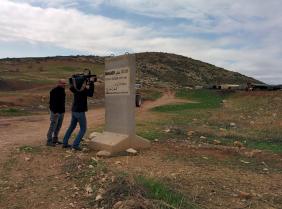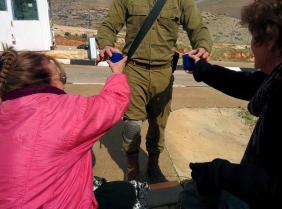Hamra (Beqaot)

We accompanied the camera crew of Channel 2 that was doing a story on the evacuation, because of army maneuvers, of a community of shepherds in Ras-al-Ahmar in the Jordan Valley. Exposing the suffering of the Bedouins in the Jordan Valley through the media is very important. But on that same day, everything went wrong – the schedule for evacuating the residents changed all the time, we were delayed at a checkpoint that hasn’t been active for a few months, the cars sank in mud and in the
crew of Channel 2 that was doing a story on the evacuation, because of army maneuvers, of a community of shepherds in Ras-al-Ahmar in the Jordan Valley. Exposing the suffering of the Bedouins in the Jordan Valley through the media is very important. But on that same day, everything went wrong – the schedule for evacuating the residents changed all the time, we were delayed at a checkpoint that hasn’t been active for a few months, the cars sank in mud and in the
end, only the photographers continued to the place; we retraced our steps and didn’t see the evacuation.
Tapuah Junction and Za’tara – 9:00
Army strength is intensified. On the road around the rotary, there is an army vehicle with soldiers. Lately a fence and a path has been installed around the rotary, apparently as a defense for pedestrians (the settlers). We also saw a defined path for pedestrians between the road to the Jordan Valley and the road in the direction of Hawwara. Thus pedestrians are distanced from the rotary and protected by the fence.
The Entrance to Akraba and Juarish are blocked for a month already by a wave of stones.
Ma’ale Efrayim Checkpoint
There were no soldiers either going or on the way back.
Hamra Checkpoint – 9:30
For a long time, only one lane has been open to passing cars. On the way, there weren’t many cars in line; when we returned, 5 cars from the east were waiting. During the entire shift we saw a lot of army activity - soldiers training, army tents, many vehicles: tanks, trucks carrying cars and other kinds of vehicles.
Evacuation of Bedouin communities for army training purposes.
This is a widespread phenomenon that has continued almost all year round, for years, except in summer. Then, they cause large fires to the pens and the pasture areas. This happens in the north of the Valley, next to the settlements, that never have to evacuate. These evacuations will always be communities of Bedouin shepherds. This month the community ofRas el Acmar, whichnumbers 10 families, is chosen. This is not the first time that the army has harassed them. They live beyond the Gochya checkpoint opposite the settlements Roi and Avzik. We intended to arrive at Avzik but at the last minute they cancelled the maneuvers there because army vehicles were stuck in the mud. Steady rain also fell the day before our visit in the Valley (26.1.), and they evacuated residents from their homes. The cold is penetrating and it is lucky for them that it didn’t rain. About a week before the evacuation, each family received an evacuation order for a day and at a certain hour. This time, the evacuation was “just” for from 5-8 hours. The order stated that all the Bedouins, including babies and old people, as well as all flocks including one-day old lambs unable to walk, had to leave and distance themselves from the area, with no covering or protection from the terrible weather, and to wait until the end of the maneuvers. After every maneuver like this live ammunition from explosions remains which the soldiers don’t bother to pick up. As a result of this, every year 3-4 shepherds are killed and others are injured, most of them young people.

Gochya Gate, was once opened for a short time three times a week, and in the end was closed completely. This time it was opened for the army. It was clear that they would not let us pass and therefore we chose bypass roads in bad condition for a distance of tens of kilometers. We arrived at Tayasir Checkpoint, that hasn’t been active for about 4 months. Just in our honor, two women soldiers stood at the checkpoint and wouldn’t let us pass. They took our identity cards and told us they would call their commander who would come and decide. Here we separated from our camera crew who were equipped with press documents and were allowed to continue on. The commander arrives and with his permission we are allowed to continue but we did not have any time. The soldiers were very polite, they prepared coffee for us. After several hours at the checkpoint, we traveled by taxi to a Bedouin family in the area. The camera crew met us as they left Gochya Gate.
